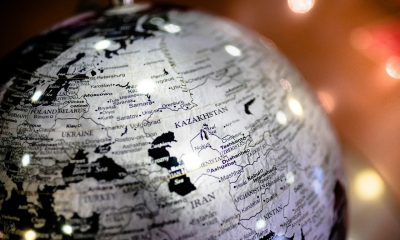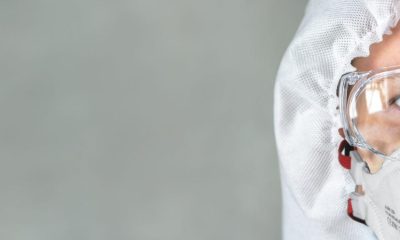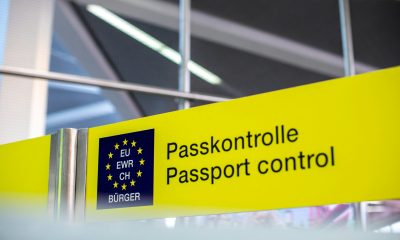koronavirusas
EAPM: Aljanse nėra „pandeminio nuovargio“, o naujienlaiškis yra prieinamas!

Good afternoon, health colleagues, and welcome to the last European Alliance for Personalised Medicine (EAPM) update of October. We hope you are all looking forward to the best Hallowe’en you can enjoy under present circumstances, so on with the news, writes EAPM Vykdomasis direktorius Denisas Horgan.
Newsletter, and no EAPM pandemic fatigue
As you will see from the update below, frustration and anxiety about coronavirus restrictions is being referred to as ‘pandemic fatigue’ - there is no such fatigue on the part of EAPM, as you will see from our ongoing work which is outlined in our newsletter, rasti čia, as well as our upcoming work on the EU Beating Cancer Plan and the EU Health Data Space, as well as our engagement with the institutions.
EU to fund transfer of COVID-19 patients between countries
The European Union will finance the transfer of patients across borders within the bloc to prevent hospitals from getting overwhelmed as COVID-19 infections and hospitalisations spike in the continent.
After a video conference of EU leaders to discuss the health crisis on Thursday (29 October), Commission President Ursula von der Leyen said the EU executive had made available €220 million ($260m) to move COVID-19 patients across borders. “The spread of the virus will overwhelm our healthcare systems if we do not act urgently,” she said.
At the meeting, leaders agreed to better co-ordinate efforts to battle the virus as infections in Europe exceeded 10 million, making the continent again the epicentre of the pandemic. EU countries want to avoid divisions which dogged the 27-nation bloc at the beginning of the pandemic, when nations vied with each other to buy scarce medical equipment.
EPSCO unites
Following Thursday’s meeting, health ministers are meeting today (30 October) under increasingly dramatic and pressurized circumstances, as the spread of the coronavirus encounters growing resistance to government measures in Italy and Germany.
EAPM will be closely following the work and outcomes of the EPSCO council, as well issues relating to key policy areas, as health ministers discuss how better to co-ordinate as countries return to one form or another of lockdown.
On Thursday, Commission President Ursula von der Leyen announced a package of measures to help, which ranged from co-ordination on testing and a Europe-wide passenger locator form as well as the expansion of green lanes.
Pandeminis nuovargis
It is perhaps inevitable that after nearly eight months of restrictions and lockdowns, with people’s lives globally being forced to change in order to fight the pandemic, that frustrations and fatigue with the status quo, will come to the fore. In recent weeks, many countries have been reporting an increase in ‘pandemic fatigue’ – people are feeling demotivated about following recommended behaviours to protect themselves and others from the virus.
Finding effective ways to tackle this fatigue and reinvigorate public vigilance is a growing challenge as the crisis continues. Pandemic fatigue evolves gradually over time and is affected by the cultural, social, structural and legislative environment.
High-level public health experts from more than 30 countries and many partner organizations from the World Health Organization (WHO) European region connected remotely to search together the root causes of this phenomenon and share national experiences and plans.
At the request of European member states, WHO/Europe developed a framework of policy recommendations to guide governments in the planning and implementation of national and subnational strategies to bolster public support for COVID-19 prevention measures.
It includes 4 key strategies:
-
Understand people: Collect and use evidence for targeted, tailored and effective policies, interventions and communication.
-
Engage people as part of the solution.
-
Help people to reduce risk while doing the things that make them happy.Pripažinkite sunkumus, kuriuos patiria žmonės, ir atkreipkite dėmesį į gilų pandemijos poveikį jų gyvenimui.
At their summit on Thursday, EU leaders pledged to promote co-operation in every aspect of their fight against the coronavirus — by keeping borders open, improving testing and contact tracing, monitoring critical care capacity and developing plans for the swift manufacture and distribution of vaccines.
Dutch Prime Minister Mark Rutte said: “We have different situations in EU countries so it’s good that the handling of measures is in the hands of member states, but of course we need to co-ordinate.”
German Chancellor Angela Merkel said: “A co-ordinated European approach is of great importance, especially for Germany as a country in the middle of Europe, it is important that the borders remain open.”
Italian Prime Minister Giuseppe Conte said: “Close co-ordination between governments and the European Commission is essential to respond quickly and effectively to the new wave of COVID-19. The health response must go hand in hand with the economic one. Only a united Europe will overcome the crisis.”
And that is all for this week and all for October, isn’t the year just flying by, despite all the stresses and strains of COVID-19? In November, EAPM will have two academic articles arriving, addressing two topics from multi-stakeholder authorship, including an article on gene therapy as well as one on Alzheimer’s and related dementia.
Čia yra ryšys to our newsletter again – do try to have an enjoyable Hallowe’en weekend, stay safe and well, see you next week.
Pasidalinkite šiuo straipsniu:
-

 Konfliktaiprieš 4 dienas
Konfliktaiprieš 4 dienasKazachstanas žengia: Armėnijos ir Azerbaidžano takoskyros tiltas
-

 Išplėtimasprieš 4 dienas
Išplėtimasprieš 4 dienasES prisimena 20 metų senumo optimizmą, kai įstojo 10 šalių
-

 Skaitmeninių paslaugų įstatymasprieš 5 dienas
Skaitmeninių paslaugų įstatymasprieš 5 dienasKomisija ėmėsi veiksmų prieš Meta dėl galimų Skaitmeninių paslaugų įstatymo pažeidimų
-

 Covid-19prieš 4 dienas
Covid-19prieš 4 dienasPažangi apsauga nuo biologinių veiksnių: itališka ARES BBM sėkmė – biologinė barjerinė kaukė
























